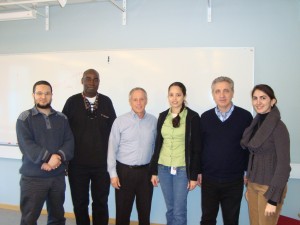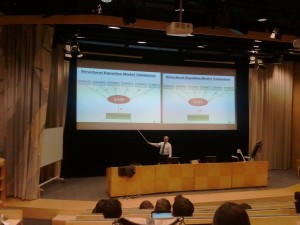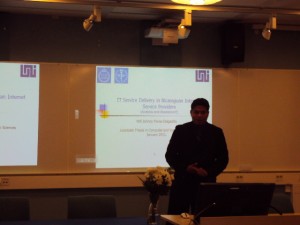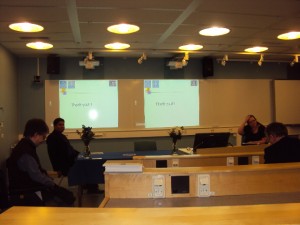On March 22, 2011 the IT Management group has discussed their research work with Professor Jerry Luftman. In the meeting we had a fruitful discussion about how should we develop our research and also about possibilities to cooperate in the research area of Business-IT Alignment. Professor Jerry Luftman has shown to have an interest in our research work and has given us many good ideas to explore. A picture from this meeting with Professor Jerry Luftman you could find below.
Open Seminar with Professor Jerry Luftman on March 21, 2011
At the invitation of IT Management group within SYSLAB Professor Jerry Luftman has given on March 21, 2011 in Forum – Aulan an open seminar. A short description of the seminar topic and information about our distinguish guest speaker including his presentation you could find below.
Topic: IT-Business Strategic Alignment Maturity
The beginning of the 21st Century is marked by the continued penetration of Information Technology (IT) into all facets of the organization. Businesses, regardless of their size, cannot function without IT enabling/driving every activity, from traditional systems such as e-mail, accounting, payroll, and inventory management, to strategic applications that interact with customers and partners. In spite of recognizing the above, for over 30 years, aligning IT and business organizations have remained a pervasive and persistent problem. Professor Luftman has created an assessment of the maturity of this important relationship; in fact he has conducted assessments from over one-third of the global 1,000 companies. The purpose of this seminar will be to introduce attendees to the model and present some of the important benchmarking insights that have resulted from Professor Luftman’s research.
Speaker:
Professor Jerry Luftman is a Distinguished Professor at Stevens Institute of Technology New-York, USA, Wesley J. Howe School of Management. He is the founder and Executive Director of the Howe School’s Graduate Information Systems Programs. Professor Jerry Luftman’s career includes strategic positions in management (Information Technology and consulting), management consulting, Information Systems, and education. Dr. Luftman’s experience combines the strengths of practitioner, consultant, and academic. His proficiency in business-IT alignment, books, published research, consulting and teaching/speaking engagements further exemplify Dr. Luftman’s expertise and leadership in his field. After a notable twenty-two year career with IBM, he is currently a Distinguished Professor at Stevens Institute of Technology School of Management.
The pdf file of Professor Jerry Luftman’s presentation you could find here Luftman SAM MATURITY Stockholm
Papers accepted for publication in the proceedings of Conf-IRM2011 and WSKS 2011 conferences
Three papers written by the members of IT Management group were accepted for publication in the proceedings of 2011 International Conference on Information Resources Management (Conf-IRM2011), Seoul, South Korea (http://conf-irm2011.org) and in the proceedings of the 4th World Summit on Knowledge Society (WSKS 2011), Mykonos, Greece (http://www.wsks.org/).
The first paper accepted for publication in the proceedings of the Conf-IRM2011(published in AIS e-library) is having as authors: Johnny Flores Delgadillo, Lazar Rusu and Paul Johannesson and is named “A Maturity Model of IT Service Delivery”. The paper is proposing a maturity model that is oriented to formalize and assess the maturity levels of IT service delivery. The maturity model is supported by IT service delivery elements that are considered significant for managing IT service delivery in the Nicaraguan Internet Service Providers sector, by IT service concepts and maturity model properties complemented by the IT Service Capability Maturity Model.
The second paper accepted for publication in the proceedings of the Conf-IRM2011 (published in AIS e-library) is having as authors Anayanci Lopez Poveda, Lazar Rusu and Paul Johannesson and is named “Improving a Method for Analysing Information Technology Service Strategy in Governmental Organisations in Nicaragua: Ex-post Analysis”. The paper is presented the improvement of a method for analyzing IT service strategy from the perspective of the implementer and designer after the use of the method in the context of Governmental Organisations in Nicaragua.
The third paper accepted for publication in the proceedings of WSKS 2011 (published in Springer series in Communications in Computer and Information Science) is having as authors Hari Nugroho, Gamaludin Al Afghani, Georg Hodosi and Lazar Rusu and is named “Key Factors in Managing IT Outsourcing Relationships”. The paper is presented an analysis of the key factors in managing IT outsourcing relationships that were elicited from the IT outsourcing relationships research and which were applied in the case of three organizations in Sweden.
Open IS-seminar on IT Governance – February 2, 2011
For those interested in the presentation named “The effect of Critical Success Factors on IT governance performance in public sector organizations in a developing country” that took place on February 2, 2011 in the Open IS-seminar please access the following file: CSFs effect on IT Governance Performance – 2011-02-02
Johnny Flores’s Licentiate Seminar
On January 31, 2011 our colleague Johnny Flores has defended successfully his Licentiate Thesis named: “IT Service Delivery in Nicaraguan Internet Service Providers: Analysis and Assessment”. On behalf of research group in IT Management I would like to congratulate Johnny for his achievement. Some pictures from the seminar and after the seminar are included below.
Open IS-seminar: Lazar Rusu and Edephonce Nfuka
First seminar in the Open IS-seminar series. Every first Wednesday in each month.
February 2, 2011 from 12-13.00 in sal 6405A, BYO (bring your own) sandwich or lunch.
Welcome!
Title: The effect of Critical Success Factors on IT governance performance
in public sector organizations in a developing country
Key word: IT Governance
By: Lazar Rusu and Edephonce Nfuka
Abstract
Today in many public sector organizations, the use of IT has become ubiquitous in every facet of the organizations’ endeavours in supporting and evolving public services delivery. This ubiquitous use of technology have caused a critical dependency on IT, which in this environment involves a complex mix of political, organizational, technical and cultural concerns that call a specific focus on effective IT governance. Accordingly, the success factors for governance over these organizations IT resources must be entrenched and adhered to if they have to increase contribution of IT in achieving their objectives. Several researches have been done on such IT governance and necessary success factors in these organizations. Yet with no focus to such organizations in a developing country like Tanzania, which on one hand is characterized by IT resources, knowledge, and culture constraints and on other hand by the increase of IT investments and applications.
However, recently, based on IT governance focus areas and five organizations from this environment, an exploratory study to address such a gap has been pursued specifically on identifying Critical Success factors (CSFs) for effective IT governance. Although based on such a study it is reasonable to believe that these CSFs have effect to IT governance performance, this has not been confirmed. In this paper we have specifically addressed such a gap by hypothesizing that such correlated effect exists and we deductively examined it.
This was achieved based on a developed research model, survey research method, sample data from Tanzanian public sector organizations and a second generation structural equation modelling technique namely partial least squares (PLS). The result indicated significant moderate to high positive effects to IT governance. The CSF with most significant effect was “Involve and get support of senior management” and the least “Consolidate, standardize and manage IT infrastructure and application to optimize costs and information flow across the organization”. Finally a CSFs model for effective IT governance in this environment was also suggested. The findings provide more focus on CSFs that have a higher impact on IT governance performance in public sector organizations in a developing country and can improve available approaches.
Paper published in International Journal of Information Technology and Management
A paper named “Assessing the Risk Exposure in IT Outsourcing for Large Companies“ and written together with Georg Hodosi has been published in International Journal of Information Technology and Management, Vol. 10, No. 1, pp. 24-44, 2011. The paper is presenting the design of an information technology outsourcing (ITO) tool that includes a procedure based on transaction cost theory for assessing the risk exposure in ITO. The ITO tool presented in this paper is a useful and effective instrument for the IT decision-makers in support of decisions to outsource IT or not. In the development of the ITO tool, we have approached two large companies in Sweden with more than 20 years experiences in ITO that have helped us in the improvement and evaluation of the usability and effectiveness of this tool. For more information about this paper please access the following link: http://www.inderscience.com/search/index.php?action=record&rec_id=37760&prevQuery=&ps=10&m=or
DSV is Co-organising BUSITAL 2011
The 6th International Workshop on Business/IT-Alignment and Interoperability is arranged in London the 20th of June, 2011.
Members of DSV staff are involved in various ways in the arrangements. Please consider contributing to the workshop by submitting your research reports.
The Conference on Advanced Information Systems Engineering (CAiSE’11, an important conference) is co-located with the workshop.
Additional info can be found at the workshop site. Info about CAiSE’11 can be found at http://www.caise2011.com/index.php





